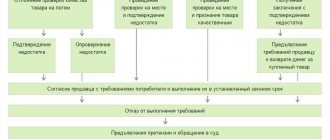Issues discussed in the material:
- Is it possible to refund the insurance premium?
- New rules for the return of insurance premiums for early repayment of a loan from 09/01/2020
- Subtleties of the return of the insurance premium upon early repayment of the loan
- Insurance premium refund guarantees
- How will the new conditions for the return of the insurance premium upon early repayment of the loan affect the loan rate?
On September 1, 2021, new rules for the return of insurance premiums for early repayment of a loan came into force. In most cases, it is unlikely that you will be able to get a loan without drawing up an insurance contract. And this applies to a significant part of loans, be it a mortgage or a car loan. Some banks literally impose insurance or increase the loan rate if the client refuses to take out insurance.
If it was not possible to refuse to conclude an agreement with the insurance company, the client has 14 days to terminate it after receiving the loan. But here, too, the banks resorted to a trick by offering a collective insurance agreement. But don't despair. It is possible to get back the overpayment for insurance, especially if you repay the loan early. We will tell you about the intricacies of this procedure right now.
Is it possible to refund the insurance premium?
Borrowers are usually offered insurance of one type or another - against an accident or loss of a source of income, insurance for financial risks, health and life. It becomes part of the loan. Some pay off their loans early (with their own money or by taking out another loan and refinancing with more favorable terms).
This is a typical situation, but not all clients of credit institutions know about the possibility of returning the insurance premium for early repayment of the loan, which is available even after the expiration of the “cooling off” period - two calendar weeks from the date of registration of the insurance. You can submit an application for the return of insurance only when the contract stipulates the relationship between the balance of the debt and the insurance compensation (that is, if an insured event occurs, the payment will be equal to the entire remaining debt to the creditor organization).
But there is a trick that is actively used by insurance companies: insurance payments are zero in the event of an emergency (accident, illness, disability) if the client has already repaid the debt ahead of schedule. If there is no balance on the loan, then there is no insurance compensation, and it will not be paid, no matter what happens.
This is unfair, but there is a way to get around this restriction and partially return the insurance premium (your payment to the insurance company when signing a loan agreement) - that part of it that corresponds to the insurance period that has not yet expired. No insurance cases will be required for this: the return is made on the basis of early repayment of the loan.
There is a general rule: the insurer should not return the cost of insurance at any time at the request of the client if he suddenly changes his mind or decides that he will do without the policy. Early repayment of a loan in itself does not oblige the bank to return the funds to the borrower. Everything is determined by the terms of the loan agreement:
- Refund of the insurance premium in case of early repayment of the loan is not possible if the insurance is not affected by the amount under the main contract, and its term is not affected by debt repayment. Then, no matter how early you pay off the loan balance, the insurance will still not end earlier. Therefore, you will not be able to receive money for the remaining period.
- Refund of the insurance premium upon early repayment of the loan is possible if personal insurance was voluntary and the compensation depended on the amount of the debt. Then the insurance ends exactly at the moment when you pay off the entire debt, and part of the insurance premium (in proportion to the time remaining until the end of the term) can be returned to you.
Suppose a person takes out a loan for a year and purchases a life insurance policy from the manager in the amount of 5,000 rubles. He manages to repay the entire loan within a month, but he loses the money spent on the policy: his insurance is not tied to this loan and remains in force.
In cases where there are grounds to demand a partial refund of the insurance premium, but the insurance company refuses to do so, you can appeal its refusal. If we are talking about amounts less than 500,000 rubles, then first of all they turn to the financial ombudsman, and only then go to court.
Is it possible to return loan insurance?
Insurance when obtaining a loan is an additional service. But there are two types of policies that the bank has the legal right to require:
- car insurance (for a car loan);
- collateral insurance (if a loan is taken, for example, secured by real estate).
In such cases, banks must be protected, and it will not be possible to return funds under such insurance.
In all others this is possible. However, despite the voluntary nature of such insurance, certain problems may arise with their return. For example, the following:
- Manipulation of bank employees. Using various methods, the bank presents insurance as mandatory and necessary. In some cases they talk about this directly, in others they are silent about such a service in advance and intrusively offer to arrange it already at the time of signing the loan agreement, for example.
- Unlawful conditions on the part of the bank. We are talking about cases when you are told that without taking out specific insurance (but not one of those that we talked about above), you will not be given a loan.
- Certain conditions specified in the contract. For example, the contract may indicate limited cases in which you can return the insurance, or not indicate them at all - such situations are especially difficult to resolve. After all, you signed it yourself, no one forced you. And the fact that these conditions could be written in small print or formulated ambiguously, from a formal point of view, unfortunately, does not change anything. In such situations, it is better to seek help from lawyers, at least for a detailed legal analysis.
- Refusals of insurance companies to return funds and others.
The best way to get your insurance back is to use the “cooling off period”. According to the law, you have two weeks to change your mind and refuse insurance. To do this, you need to write a corresponding application and submit it to the insurance organization. In your application you must indicate the details for which you would like to receive a refund.
The money must be returned to you within ten days after submitting the application.
But what if such a period is missed - or you want to return the funds under other conditions?
New rules for the return of insurance premiums for early repayment of a loan from 09/01/2020.
On September 1, 2021, the procedure for returning part of the insurance premium for early repayment of a loan changed (if the policy was needed specifically in order for the loan to be approved). If previously such returns were sought mainly through the courts, and by default insurers did not make returns and the outcome of the case was determined by the terms of the contract and the position of the lender, now the possibility of return is available to absolutely all borrowers. If you repay the loan early, you are entitled to compensation for the remaining premium. However, there are some nuances.
The changes will affect those who took out a loan along with insurance (insured the property, their own life or health) and managed to repay their entire debt to the bank ahead of schedule. Obviously, this former borrower no longer needs insurance, and it would be quite logical to return the remaining money to him for this service. Before the new rules, this tended to cause problems. Now the conditions have become more transparent and universal, and the chances of getting your money back have increased.
So, the new law obliges insurers to return funds to borrowers if the following conditions are met:
- the policy was purchased no earlier than September 1, 2020;
- insurance was taken out for the purpose of obtaining a loan and was voluntary;
- there were no insurance claims;
- The loan was repaid ahead of schedule and in full.
For example, a borrower takes out a loan for four years and immediately purchases a health and life insurance policy for this entire period of time. However, in two years he successfully pays off all the debt. As a result, when repaying the loan early, he can claim a refund of that part of the insurance premium that is proportional to the remaining time of the loan. And if before September 1, 2020, the insurance company and the bank could refuse him this on completely legal grounds, now they cannot.
The procedure for returning the remaining premium is simple: submit an application either to the bank, if it sold you the policy itself, or directly to the insurance company, if you purchased the policy from it. Expect your money within the next seven business days from receiving your application. Remember that you will not receive back the entire amount spent on insurance, but only part of it for the period of the loan agreement that has not yet expired. This condition now applies to all borrowers.
Return consumer credit insurance
Let us dwell on those moments when the contract does not indicate (or does not take into account) the conditions for the return of insurance funds. Most often, in such situations, it is necessary to demand a refund of money, based on the conditions and provisions of the law that correspond to these conditions.
What types of insurance can be provided for consumer loans:
- life (for example, from a threat due to illness or in emergency, traumatic cases);
- voluntary medical;
- financial risks;
- from cases of harm or other damage, etc.
How could you obtain this insurance (the very conditions that may be grounds for a refund under the law):
- They imposed it on you in any way - for example, they assured you that without it a loan is impossible, or they said that this is the law.
- You have been charged interest on the imposed insurance.
- The insurance interest was increased, which you were not warned about (again, you need to study the contract - some banks reserve this possibility in the clauses of the document).
- You were given it “automatically”, as one of the self-evident conditions of lending, etc.
If the “cooling period” has not yet ended, submit a denial application to the insurance company.
If not, determine the conditions that are relevant to your situation. Then contact the bank or insurance company with statements or claims. Each of them is drawn up according to the same principle that we talked about just above, and they are relevant at any stage of repayment of the loan - regardless of whether you have closed it or not yet.
Subtleties of the return of the insurance premium upon early repayment of the loan
But there is also bad news. The law introduced the concept of an insurance contract, which was concluded for the borrower to fulfill its contractual obligations on a consumer loan or loan - in accordance with Part 2.4. Art. 7 of the Law “On Consumer Credit”.
Therefore, not all insurances are subject to return, but only those that ensure the fulfillment of the loan. This is the problem for the client: not all insurances meet this criterion, since not all of them were concluded to guarantee the fulfillment of debt obligations.
Let's look at a practical example. The borrower needed a loan of at least RUB 300,000. September 1, 2021 has already passed, he turned to PochtaBank and successfully received this loan, but at the same time he was imposed a life insurance policy in the amount of 135,000 rubles. from AlfaStrakhovanie-Life. Thus, the value of his loan increased to 435,000 rubles. Not knowing the intricacies of the law, the client was in no hurry to refuse this insurance during the “cooling off” period.
The loan he took out was of no use to him, and the original amount was 300,000 rubles. he soon returned the jar. After re-reading the contract, he discovered with horror that he was not entitled to a refund of the insurance premium upon early repayment of the loan, even partial, since the insurance did not fall under the definition of “concluded to ensure the fulfillment of the loan.” In order for the premium to be returned, the loan would have to be repaid in full by paying another 135,000 rubles.
Of course, he did not want to lose this amount. But in order to start the refund procedure, he was forced to pay this money out of his own pocket - only then would the bank issue him a certificate of full repayment of the debt.
The Central Bank of the Russian Federation, as expected, took the side of the insurance company, since the policy sold did not provide this loan in any way.
The outcome of the case is still unknown. Other options remained untried, for example, appealing to an authorized financial court.
Keep in mind that after November 28, 2019, a client of a financial institution can sue the insurance company only when he receives a decision on his appeal from the financial ombudsman. This provision is fixed in paragraph 4 of the “Review of the practice of courts considering disputes arising from relations on voluntary personal insurance related to the provision of a consumer loan,” approved. by the Presidium of the Supreme Court of the Russian Federation on June 5, 2019, and in Federal Law No. 123-FZ “On the Commissioner for the Rights of Consumers of Financial Services” dated June 4, 2018 (Part 2 of Article 25, Part 6 of Article 32).
It is not necessary to contact all other authorities (for example, Rospotrebnadzor and the Central Bank).
I wouldn’t like to think about sad things, but we have to admit that both credit and insurance organizations are actively exploiting this loophole in the law, which allows them not to return the insurance premium even after September 1, 2020. They use encrypted conditions in the contract that are impossible to understand without the help of a lawyer. The contracts are deliberately drawn up in such a way that they cannot be unambiguously classified as insurance contracts to secure loan obligations.
Such voluntary-compulsory insurance is beneficial to both the insurer and the bank: they both receive income from it. This is all recorded in their internal terms of cooperation. At the same time, refusal to buy insurance increases the risk of not getting a loan at all, although the bank’s documents state the opposite: that insurance is voluntary and the decision to issue a loan does not depend on it (although the loan rate does depend). That is, the conditions for registration of receipt will actually be different for those who bought insurance and those who refused it.
This is not explicitly described anywhere - on the contrary, something completely different follows from the loan agreements. It seems that on paper there are some conditions, but in reality they are different.
There is another significant flaw in this law: if the borrower refuses collective insurance, repays the loan early and asks to be excluded from the list of insured, then he can only count on a refund of the insurance premium and only for the upcoming period until the end of the loan term (see p. 10 Article 11 of the Law “On Consumer Credit”).
In reality, this premium often turns out to be the smallest expense item compared to all other payments: bank commission, connection fee, etc. These payments can only be returned in the traditional way - through the court (see Article 32 of the Law on the Protection of Consumer Rights ").
How to get your insurance back after paying off your loan
Unfortunately, there is no guarantee that you will be able to return the insurance money after you have repaid the loan. Such cases are often very difficult to resolve due to various factors:
- terms of the contract;
- the absence in the contract of any conditions for insurance or its return;
- bank positions;
- behavior of the insurance company, etc.
However, you have the opportunity to return at least part of the funds. Under what conditions is this permissible:
- You have fully repaid your loan debt.
- The contract does not clearly state that insurance refunds are not possible.
- The insurance contract for this loan is still valid, that is, it has not expired in the specified manner or has not been terminated.
Also, before taking action to get your money back, review the contract for other information. You need to understand who is the beneficiary of the insurance - a bank or a financial institution. This will determine where you should go.
If a bank is indicated, then you must submit a claim there, describe the terms of the loan received, indicate the repayment of the debt and demand the return of the insurance money. The following should also be attached to this document:
- loan agreement;
- insurance policy and contract;
- all payment documents and certificates reflecting full repayment of the loan debt;
- your passport.
What such a statement must contain:
- details of the insurance company;
- your data;
- all necessary information about credit and insurance;
- the exact amount you paid for insurance;
- reference to the “Consumer Rights Protection Law” - this is necessary as the basis for your request;
- details by which you would like to receive funds.
Approximately the same procedure (and content of documents) is required when contacting an insurance company.
If the credit insurance agreement is no longer valid, it will not be possible to resolve this issue administratively, and contacting a bank or organization will be useless. If in this situation you still intend to return the funds, you should go to court.
Things to remember about statute of limitations:
- you can go to court on a similar issue within three years from the moment the insurance contract was signed;
- If you are still paying off the loan, or the loan was issued for a period of more than three years, you should first apply for the restoration of the missed statute of limitations.
Insurance premium refund guarantees
However, there is also optimistic news: Law No. 483-FZ contains some important client guarantees. If a borrower who paid for collective insurance and refused it during the “cooling-off” period submits an application to remove him from the list of insured persons, then the bank (or another company that connected the client to this insurance in the interests of the credit institution) must reimburse the client absolutely all costs for connection: and the fee for it, and the commission, and the insurance premium. For more details, see Part 2.5 of Art. 7 of the Law “On Consumer Credit”.
In case of purchasing individual insurance, the client’s refusal within two weeks gives him the right to a full refund of the insurance premium. This provision is reflected in paragraph 11 of Art. 11 of the above law.
Returns, in both cases, must be made within seven working days. And it is possible only on the condition that there were no previous events that could be classified as insured events.
From September 1, 2021, when providing insurance services to borrowers to secure a loan, they must be informed about:
- the essence of this service;
- the maximum amount of payment (with premium, fee for joining the insurance contract, commission and other expenses) for the service or the ratio of these payments and the amount of the insurance premium;
- the right to refuse insurance for a period limited to two calendar weeks (to do this, it is enough to send an application for exclusion from the list of insured persons to the bank or other person acting in its interests).
P. 2.2. Art. 7 of the Law “On Consumer Credit” confirms the obligation of banks to issue loans without joining the insurance program, but at an increased rate (except in cases where personal insurance is strictly mandatory).
However, this guarantee has little relation to reality: not a single regulatory act of the Russian Federation contains a provision on mandatory personal health and life insurance. But its voluntariness is mentioned in the “Review of judicial practice in civil cases related to the resolution of disputes regarding the fulfillment of loan obligations,” approved by the Presidium of the Supreme Court of the Russian Federation on May 22, 2013 (clause 4), and in the Civil Code of the Russian Federation (Article 935). It is mandatory to insure only the collateral if we are talking about a mortgage (Clause 1, Article 31 of Law No. 102-FZ of July 16, 1998).










